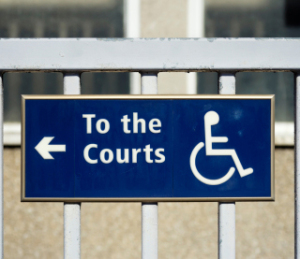 As with most social engineering legislation, the Americans with Disabilities Act (ADA) was enacted with the best of intentions. Passed in 1990, one of the primary objectives of the ADA was to assure disabled citizens access to public places and private businesses – and that’s a good thing. But to accomplish this ambitious objective, the infamous Title III public accommodation section piled up sweeping regulations regarding parking, curb height, service counters, signage and the size of restrooms. If you own a building, lease office space or operate a business that serves the public, there is some component of your life touched by ADA Title III.
As with most social engineering legislation, the Americans with Disabilities Act (ADA) was enacted with the best of intentions. Passed in 1990, one of the primary objectives of the ADA was to assure disabled citizens access to public places and private businesses – and that’s a good thing. But to accomplish this ambitious objective, the infamous Title III public accommodation section piled up sweeping regulations regarding parking, curb height, service counters, signage and the size of restrooms. If you own a building, lease office space or operate a business that serves the public, there is some component of your life touched by ADA Title III.
In terms of interpretation and implementation, the ADA was a mixed blessing from the beginning. Although it has undoubtedly accomplished a lot of what it was intended to do, it has also caused hardship for landlords and businesses when regulations were enforced too aggressively or applied unevenly.
But as unsatisfactory as ADA enforcement can be, no one could have anticipated something worse: a juggernaut of sham ADA lawsuits plaguing businesses of all types. With increasingly regularity, these so-called drive-by lawsuits are filed against individuals or organization on behalf of questionable plaintiffs whose sole interest is collecting a settlement. Typically, this litigation is initiated by disabled individuals who visit a building specifically to identify a “violation” and bring a bogus lawsuit.

 Chicago Business Attorney Blog
Chicago Business Attorney Blog


